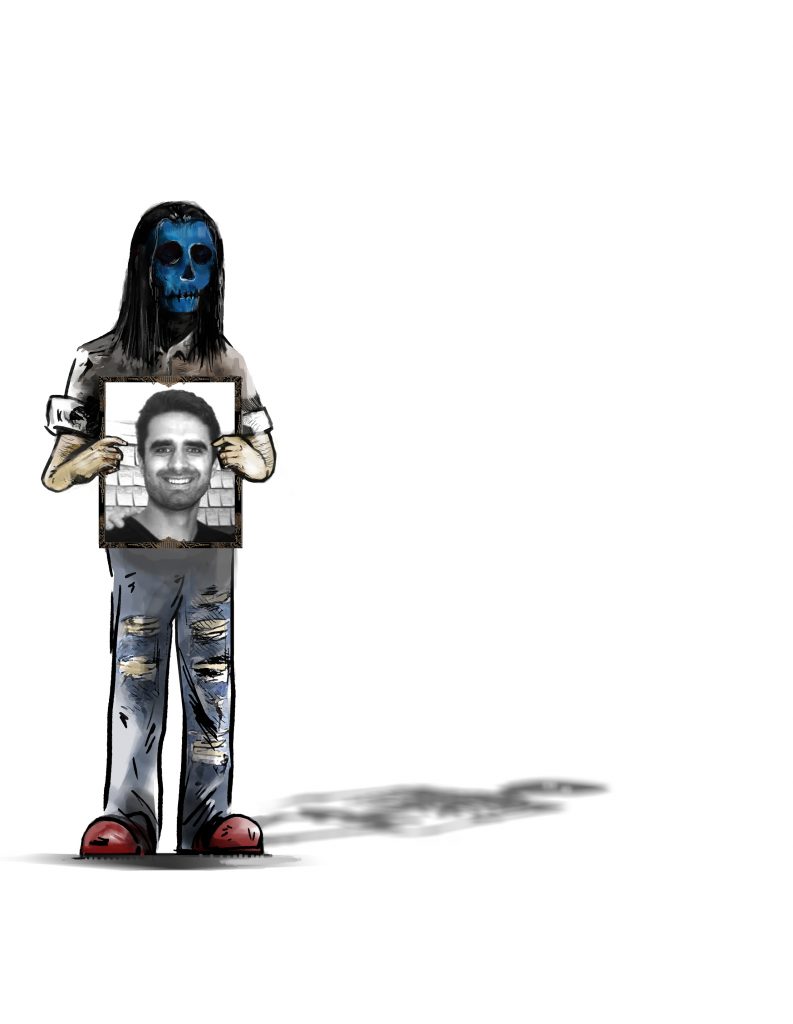Khalil Sullins: Director for Listening
My first memory of Khalil is walking together with our wives, through Old Town Pasadena one night. He told me of a screenplay he had recently finished for a movie called Listening.
Admittedly and secretly, I felt bad for him.
Maybe I’m a little jaded, but I’ve been in Los Angeles long enough to have seen a lot of people leave. It’s happened to me. I’ve gotten fed up and left, twice. I arrived in California in the mid ’90s with an idea of what life was going to be. I expected to see my dreams come to a completion, I expected my dearest wishes to be fulfilled, and they were, mostly; but it hurt.
Son of a bitch, it hurt!
So when Khalil told me that he was a director and just completing his first film, I thought, “Bummer, that’s going to be rough.” And I’m sure it was, but he did it.
Son of a bitch, he did it!
He raised financing and made his movie. And you know what? It’s actually pretty good. Which is what we come to think when it’s not a Hollywood blockbuster, as if the word actually, actually applies. As if only the big studios can make good movies. The recent incarnation of Fantastic Four should remove some doubt. If not all! And the same rules apply to self-published authors or bands recording at home.
It’s tough, but it can be done.
His movie Listening is a fanciful leap into the possibilities of mind reading; and don’t expect big theatrics, because there aren’t any. Like most directors’ first movies, it’s a step into honest storytelling, because without all the explosions and nonsensical computer graphics, that’s what you’re left with.
Honesty.
And like many Bahai’s, Khalil’s ideals are infused into the story, such as…
1: Human beings are created to be noble and thusly equal.
2: Science and religion must be in accordance in order to find truth.
3: When religion becomes a form of contention, put it down.
Recently he and his wife were over for dinner. We spoke about our families and the unnecessary complications of childhood, and I found Khalil to be refreshing, because unlike so many Persians that I know, he is forthright about his life. He doesn’t pretend to be something that he isn’t. And I know it’s judgmental and maybe even a little racist to say that, but sometimes generalizations become generalizations because they are generally true.
These things don’t spring into being on their own.
And I don’t know why it is, but many Persian Bahai’s are concerned about appearances. This, as far as I know, is not a tenant of the Baha’i Faith, necessarily, so I wonder if it’s not something left over from Islamic culture.
I don’t know.
We Texans tend to wear a rebellious sense of propriety on our shoulders, so it is definitely foreign for me. I don’t know which approach is better: the Texan “Up yours. I’ll do things my way,” or the more kindler-gentler “Persian” approach of “would you like some tea with that?”
I suppose they both have their good and bad points. Despite how the news portrays Persians as modern day Iranians, I find them warm, kind and inviting, often willing to give you the shirt off of their backs, so it’s an interesting juxtaposition against their portrayal in the media.
And as I said, I don’t understand this sentimentality of being overly concerned about appearances, because we all have demons.
No one is perfect.
We all have things we aren’t proud of and it’s nice when people are honest about those things. It makes them real and brighter, and I also think that it makes Khalil a good storyteller.
I wonder what he thinks…
Without further ado, Khalil Sullins.
Q: What is your favorite sandwich and who makes the best one?
K.S. It’s becoming a new trend in LA, but I’m all about avocado toast. As a kid, I’d eat it with tomatoes and “Spike” vegetable seasoning, but now I do it with lemon juice, salt, and chili pepper flakes. My wife and I make it best at home.
Q: What is your favorite meal your mom makes?
K.S. Osh. Persian soup, basically. There are a ton of different kinds. She makes a great one full of greens, beans, and noodles.
Q: How did you meet your best friend?
K.S. Our parents were friends through the Baha’i Faith when we were kids. Now I’m married to his cousin, so we’re more like family.
Q: When or how did you find what you wanted to do?
K.S. For as long as I can remember, I’ve always known what I wanted to do, but that thing just kept changing. As a kid I wanted to be a comic book artist, then it was a gallery artist. Then, for one year in high school I wanted to be a scientist, then it was a photographer, a sculptor, and animator, a special effects artist for movies.
Then I was applying to art schools for college, but, really, I just wanted to travel the world and paint. But when I got into film school, I was so excited. I knew I wanted to make movies. My general problem is that I want to do too many things, so it’s more about choosing what not to do, so that I can focus and develop one particular craft.
Q: How did you pursue it?
K.S. Well, I went to film school at Art Center College of Design. I fell in love with screenwriting in school. It’s the most creative part of the process in many ways. After school I kept working on scripts, while also painting and doing a couple of gallery shows. After writing seven or eight scripts, I felt like I finally had one good enough to invest three to five years of my life into making.
Then it was all about putting together the right team, and just working at it every day. I think with any long endeavor that requires persistence, you really have to enjoy the process. I knew I loved writing, but directing a feature was a bit of an experiment: I loved the process. It felt like finding my calling.
Q: Did you have mentor/mentors in pursuing it?
K.S. My parents instilled into me a deep belief that I could do anything, and really supported all of my artistic endeavors. That can be rare sometimes, and I’m blessed to have my parents first and foremost. In high school, I had an art teacher, Gary Snidecor, who really believed in me and honestly saved my life as I was going through some fairly significant depression in my teenage years. Art was my outlet, and he let me run wild with it.
In college, I delayed my graduation by a year so, so that I could keep taking a writing workshop class with Ron Osborn. He became a screenwriting mentor to me and continues to be to this day. It’s hard sometimes to find people with a high enough standard to be able to give you honest opinions about your work in a meaningful way, without candy-coating their critique.
Q: What do you dream of doing or are you doing it?
K.S. Making movies is a dream. For me, it’s the ultimate medium. If you paint the most amazing painting, you’re lucky if a few thousand people see it in a gallery. But with film, millions of people can experience the same thing at the same time, all around the globe.
There’s a lot of potential in that.
Ultimately, the goal is to help the world move closer towards unity, to advance our civilization in some way, shape, or form. Hopefully, I can make movies that entertain people, while also exploring the human condition in some small way.
Q: What would your 15-year-old self say to you now?
K.S. “I want all your stuff!” I had a pretty massive comic book collection growing up, but it was all lost when our house burned down in a wildfire. I’ve stopped collecting individual issues, but I’ve got a decent graphic novel collection now, along with a big comic book statue collection. My office is like a toy store for grown-ups.
Q: If life were a person what would you say?
K.S. “Hey, you got any juicy secrets?”
Q: If you were in charge of the world and you had no restrictions, real or imagined, what is the one thing you would give it?
K.S. Unity. We’re a diverse planet, and that’s beautiful. That diversity, not just of skin color, but of culture, belief, country, and religion, doesn’t need to be a source of conflict. If we can find a way to live in loving unity with each other, everything else will work itself out. No challenge will be too great if humanity can unite itself.
Q: Has morality disintegrated to the point that we now need Yelp for people?
K.S. Yes and no. We are witnessing disintegration of morality, while simultaneously seeing progress. Some things are worse than they’ve ever been, but many things are better than they’ve ever been, too. You just have to look at a long enough timeline to see the progress.
Q: How is society getting things right?
K.S. It’s happening in a lot of ways, but one thing about the age of the Internet, camera phones, and social media is that we see things faster. Injustice has fewer places to hide. It’s still there, but at least we’re getting it out into the open. That’s usually the first step.
Q: What do people need in order to see each other as equals?
K.S. True friendship. Take racism, for example. There are plenty of superficial answers, and legal solutions needed, but not until we all actually have true, deep, personal friendships with people of other races and cultures will we see real changes at the core of humanity.
Q: Do we still need religion?
K.S. God either exists, or doesn’t. There’s no way around it. If God exists, which I personally believe, then we aren’t going to truly progress without God’s religion. What maybe isn’t considered often enough is that God’s religion is one.
What if all the major religions of the world have come from a single source and are part of one single religion? Most religions actually believe this very thing. Christians believe in Moses, Muslims believe in Christ, and so on. It’s just about recognizing the most recent Messenger to find the most relevant guidance for today.
With that being said, religion is probably meant to bring people together. If it is a source of conflict and strife, then it has lost its purpose and is probably best done without.
Q: Do you have hope for the future?
K.S. Of course. Whenever I get upset about the state of the world, I look at history. If you put almost any societal issue on a long enough timeline, then it becomes easier to see the positive trajectory we are generally on. As bad as things are now, you can almost always find much worse conditions in the past, especially when it comes to issues like equality and justice. Global warming, on the other hand… that might be trouble.
Hot topic of the week.
This is an open discussion. Could be Gay marriage or Confederate flag, Donald Trump, for example.
K.S. Are the Golden State Warriors going to win 73 games this season? That’s the topic of the year, I’d say. Everything else is just details.
Q: What are three things that work for you: For example, I can’t find a good razor. Because of a near unbridled need for massive profits I find that many products don’t live up their advertising. What works for you?
K.S. I’ll give you one product that I use for three things: coconut oil. It’s the best lotion/aftershave I’ve found yet, and it’s great as hair gel too. Also, you can fry your dinner in it.
More thought-provoking questions:
1: Do Americans have the right to complain about immigration?
K.S. Native Americans? Yeah, sure.
2: If our value system is based on scarcity then what of a human life, now that the population is in the billions?
K.S. If we can figure out how to use the sun for power, the ocean for water, and stop eating animals, then we could sustain the life of many billions more, even.
3: Would life be easier if racism were accurate?
K.S. Didn’t you already mention an app for that?






